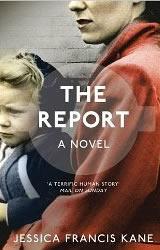Details for 'The Report' by Jessica Francis Kane
The Report

It is spring 1943 and, as the air raid warning sounds, the community of Bethnal Green flock to the shelter of the tube station. At the entrance steps, though, something goes wrong, the crowd panics, and 173 people are crushed to death. The local magistrate, Laurence Dunne, is instructed to carry out an enquiry, but little news of the incident is allowed to be made public for fear of the effect on the nation's morale. Indeed, as Dunne gathers information, he must decide how much of the truth he should reveal to the damaged community.
The story is told as flashback and in the 'present' of 30 years later when a child survivor decides to revisit the tragedy through a tv documentary. He meets with Dunne to look again at the facts and establish the cause of events.
This is a book which makes no secret of the horror of its content and, as such, perhaps many would not even entertain picking it up. However, it is beautifully and gently written. There is sorrow but no attempt at wringing the emotions. We are briefly introduced to the central characters before the tragic incident, and we learn more of them through their grief and response to the catastrophe. There is a sense of distance, perhaps due to the sense of guilt felt by the survivors, perhaps because of the mood of social behaviour at that time, or perhaps because we are still viewing the event through the objectivity of the investigator. The book's tone reminded me of 'The Suspicions of Mr Whicher' by Kate Summerscale, but was less satisfactory because, in declaring itself fiction, rather than an interpretation of historical events, it had less substance than Summerscale's book. Nevertheless, it was a fascinating book. The quality of its writing made it easy to read but the content meant that I could only take it up in small doses. It was a reminder once again of the many horrors of war, and the fact that so many people are carrying such unacknowledged sadnesses through their lives.